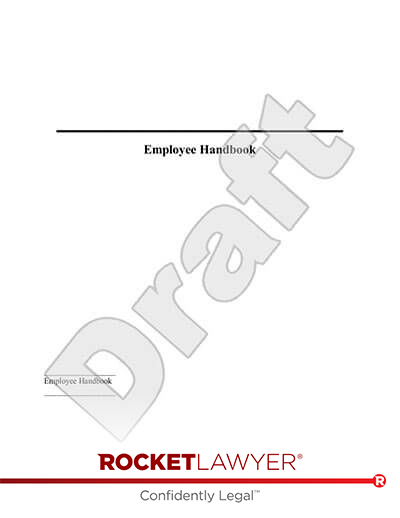Should You Have One?
There's not much debate about this-every employer needs an employee handbook.
An employee handbook helps both your staff and managers understand the various dimensions of their jobs, including laws about employment. RocketLawyer provides a helpful list of some of the areas that you can detail through your employee handbook. These include:
- Equal employment policies
- Conflict of interest
- Anti-nepotism policies
- Moonlighting
- Introductory period
- Employee background checks
- Health examinations
- Immigration law compliance
Pros and Cons
If you, as an employer, fail to provide written policies to employees, you could jeopardize your legal power to enforce such expectations. For instance, if you never inform employees that work hours are 8 a.m. to 5 p.m. , then you start writing up workers for continuously arriving at 8:30, you have little ability to use the warnings to help enforce the policy.
'What is crystal clear is that it is very hard to enforce policies when nothing is written down, and this lack of clarity can lead to bad morale, inconsistent practices and, in the worst case, liability for discrimination,' writes David Whitlock in a column for the construction industry trade website ConstructionPros.com. 'It is also important to note that some state and federal laws require that your employment policies be reduced to writing.'
Another often cited downside is that it's hard to change a policy once it's put in writing. But while changing a policy can cause a few waves and require you to spread the word to your employees, it's not all that difficult, especially for a small business.
The pros, though, are overwhelming. Clarity, clear expectations, legal protection, drug policy, benefits, incentive programs, time-off policies, discipline policies and more are covered in your employee handbook. What is an employee at your company? That question is spelled out in your employee handbook.
Ignorance is Not Bliss
For employees, ignorance of company policies that are clearly stated in the employee handbook can result in poor performance and failure to follow company policies. A worker will have a hard time explaining why a policy spelled out in the handbook was violated or ignored.
A pro is when an employee learns the handbook and keeps it handy to use for future reference as he or she progresses with the company. If an employee wants to get on the good side of human resource management, he or she should get to know the handbook.
How to Create an Employee Handbook
We offers many documents and programs that can help you create a high-quality handbook. Essentially, you answer some questions, and then create the handbook and print it. The document allows you to address key policies including drugs, social media, wages and performance review, hours and payroll practices, and promotions.
Tips for Providing Handbooks
When an employee is new is usually the best time for human resources to emphasize the importance of learning its contents. HR can effectively inform new hires about company policies by emphasizing the most important parts employees need to know during new employee orientations or when new hires first meet with their direct supervisors.
Finally, it's important to have your employees sign a receipt showing that they have received the handbook and that it is their responsibility to be familiar with all company policies.
Employee Handbook Well Worth the Effort
An employee handbook is a great vehicle for HR to communicate to employees about expectations that affect their work, including policies, benefits, compensation, hours, legal rights and company obligations, contacts and much more. It's wise to have a lawyer in your area make sure your handbook abides by your local laws.
Both employers and employees need an employee handbook throughout their relationship to ensure both parties are clearly adhering to company policies and work-related laws. We can get you started on your employee handbook.
Please note: This page offers general legal information, not but not legal advice tailored for your specific legal situation. Rocket Lawyer Incorporated isn't a law firm or a substitute for one. For further information on this topic, you can Ask a Legal Pro.
